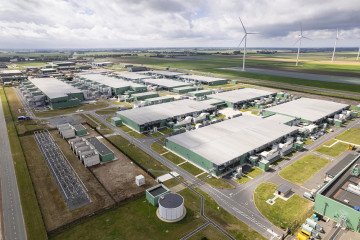As organizations push for a more sustainable world, more and more data centers are starting to explore alternative, lower carbon emission fuel options for use in their emergency power generators.
These generators that have traditionally been powered by higher carbon emitting diesel fuel combustion. Alternatives include among other options, biodiesel and hydrotreated vegetable oil (HVO).
It should be noted however, that organizations must evaluate air permit compliance when considering the use of alternative fuels. While the use of these alternative-diesel fuels is generally considered a cleaner-burning fuel compared to traditional petroleum diesel, it still produces emissions that can impact air quality and public health, thus impacting air permit compliance. In this blog, we delve into the implications of using alternative fuels in data center emergency power generators and the key considerations for maintaining air permit compliance.
Alternative Fuels and Data Centers
The data center industry is currently experiencing a period of unparallelled growth as the market size is expected to advance at a compound annual growth rate of 10.5% through 2030. Even in the face of a seemingly insatiable demand for commercial data management, more people and stakeholders are questioning data center emissions and their impact on the environment. With increasing pressure on data centers to improve their greenhouse gas footprint, the alternative fuels discussed below have risen in popularity.
Biodiesel
One alternative fuel option gaining traction for use in data centers is biodiesel. While biodiesel offers the advantage of reduced sulfur emissions, its lower British Thermal Unit (BTU) value means that more fuel is required on a gallon-per-hour basis. Understanding the air permit implications of switching to biodiesel is crucial, as it involves considerations such as emission monitoring and compliance with regulatory standards as well as potential notifications to the regulating air permitting agency in the form of an application or air permit modification.
It's also important to be aware that biofuels, including biodiesel, may contain a small percentage of methanol, which is regulated as a hazardous air pollutant. Data centers must assess the emissions associated with methanol use and implement appropriate mitigation measures to ensure regulatory compliance.
Hydrotreated Vegetable Oil (HVO)
HVO fuel, sometimes referred to as renewable diesel, also presents an attractive alternative for data centers because it not only dramatically reduces carbon and overall greenhouse gas emissions, but it also eliminates sulfur emissions entirely, offering a cleaner and more environmentally friendly option for powering generators. It also typically results in lower levels of pollutants such as particulate matter, nitrogen oxides (NOx), and carbon monoxide (CO). While this can help data centers comply with environmental regulations and mitigate their impact on local air quality, it still may require modifications to existing air permits that were applied for under the premise that diesel would be used to fuel the generators.
While there is growing interest in using HVO, challenges remain regarding its supply. With only a small number of refineries producing HVO, availability may vary dependent on geographical location. Because of this, many data centers use these alternative fuels mixed with traditional diesel in their generators since they still get credit for being more sustainable while also reducing emissions. Data centers must evaluate how the availability of HVO will impact their air permit applications and fuel procurement strategies.
Air Permitting Across Different States
Air permitting requirements vary from state to state, with some states requiring air permit modifications for the use of alternative fuels. Understanding these differences is essential for data center organizations operating across multiple jurisdictions to ensure compliance with relevant permits and regulations. Let’s look at a few air permit requirements when using alternative fuels on a state-by-state basis:
California
Using a new fuel in an emergency power generator in California requires a new air permit application be submitted to obtain the required permit modification.
Arizona
One Arizona regional air emission regulatory authority, Maricopa County, has announced that a written notification needs to be made to the Air Quality Department. The notification should reference the permit number, the combustion source, a description of the change in fuel, and assurances that the new fuel meets the low sulfur content requirements (HVO does meet the sulfur requirements).
Illinois
The Illinois Environmental Protection Agency requires a change in Operating Permit for modifications to the fuel used in an emission source.
Iowa
No Permit amendments are required; however, it is recommended that some type of notification is submitted to document a change in fuel type.
Texas
If the existing engine has been registered under Permit by Rule (PBR) 106.512, and the site wishes to switch fuel type from diesel to an alternative, then a supplemental registration is not required, but the required operational records listed in PBR 106.512 (1)(c)(ii) must be maintained.
Wyoming
A site wishing to switch to an alternative fuel would need to submit a permit application encompassing the change and show the reduction of emissions for the new fuel to be employed.
Conclusion
While altruistic motives such as minimization of either emissions or carbon footprints are to be lauded, these actions don’t relieve a facility from its obligation for full regulatory compliance. Switching to an alternative fuel is really no different than any other physical or operational change at a site that could trigger some kind of permit or regulatorily required action.
As you do the right thing for the planet, remind yourself to do the right thing for compliance as well. Fully engage your Management of Change (MOC) process by either conducting an internal regulatory review or engaging a regulatory consultant to assist in evaluating the regulatory implications of an alternative fuel change.
Do you need help with alternative fuels at your data center and air permitting requirements? Reach out to our Data Center and Air Quality Compliance experts today.
Want more news and insights like this?
Sign up for our monthly e-newsletter, The New Leaf. Our goal is to keep you updated, educated, and even a bit entertained as it relates to all things EHS and sustainability.
Have any questions?
Contact us to discuss your environment, health, safety, and sustainability needs today.







